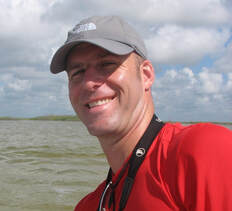
Bruce Robertson, Associate Professor of Biology Bruce Robertson is a conservation ecologist. His research focuses on questions that address important conservation issues, but that also provide fundamental insights into ecological theory. Broadly speaking, he investigates the direct and indirect impacts of human activities on biodiversity, species persistence and species interactions with special emphasis on how rapidly changing environments may disrupt evolved relationships and trigger maladaptation. He is especially interested in cases in which novel environments trigger animals to actually prefer to make inappropriate, detrimental and often dangerous decisions. These scenarios are known as evolutionary traps. Traps are an emerging conservation problem that can contribute population declines in species of concern. He collaborates extensively on a variety of projects including a study of the impact of new forms of pollution (polarized light pollution) on aquatic insects, and research investigating how to grow next generation bioenergy crops that facilitate the conservation of biodiversity. Trained as an ornithologist, Bruce increasingly uses arthropods, mammals and plants as study organisms.
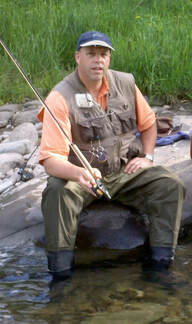
Michael Tibbetts, Professor of Biology. Mike Tibbetts is a molecular biologist who uses zebrafish as a model to investigate questions related to hearing. The lateral line system of zebrafish is comprised of structures, called neuromasts, that contain specialized cells, called hair cells, that are remarkably similar to the hair cells in our inner ear, which are responsible for converting sound waves into electrical signals that are sent to the brain. One line of investigation in the lab is based on the fact that hair cells must maintain a precise orientation in order to send sensical information about the direction of water flow across the body to the zebrafish brain. However, hair cells also need to change positions within neuromasts in order to fill in where old hair cells have died and to accommodate the formation of new ones. A second avenue of research in Dr. Tibbetts’ lab, stems from evidence from a specific mutant zebrafish and from chemical interference studies which suggest that the mechanism by which lateral line hair cells regenerate (a property that is, unfortunately, not shared by our inner ear hair cells) is distinct from the mechanism by which they first form in development. Using genetic and pharmacological interventions, Dr Tibbetts’ lab is asking which proteins and which cellular processes are important for each of these phenomena.
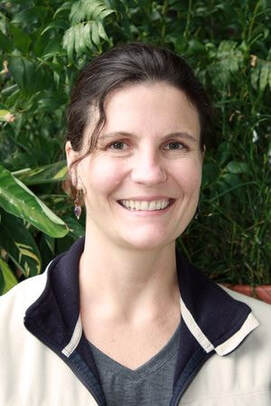
Cathy Collins, Associate Professor of Biology (Website) How do anthropogenic changes such as nutrient deposition and fragmentation influence biodiversity? How can we use this information to restore diversity and function to plant communities in degraded habitats? These general questions drive much of the work in professor Collins’ lab. By investigating spatial and temporal patterns of species’ abundances, she attempts to disentangle how the identity, order, and rate at which species undergo colonization and extinction dynamics depends on species traits, species interactions, and the quality and quantity of habitat. While Dr. Collins typically focuses on plants as a field “system”, she has addressed fundamental ecological questions with fungi, birds, insects, and mammals.
|
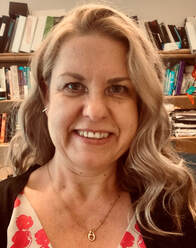
Brooke Jude, Associate Professor of Biology (Website) Brooke Jude is a microbiologist who studies isolates of microorganisms found in various (local and foreign) aquatic sources. She is currently investigating the mechanisms that aquatic bacteria use to bind to surfaces in the environment. She uses classic microbiological techniques for isolation and culture of the strains, and identifies organisms via modern sequence analysis. Investigations within the lab also include molecular cloning to create deletion strains, biofilm assays, protein expression, tissue culture binding assays and investigation into bacterial behavior within microbial communities.

Felicia Keesing, David and Rosalie Rose Distinguished Professor of Science, Mathematics, and Computing (Website) Felicia Keesing is a community ecologist who studies the consequences of interactions among species. Since 1995, she has studied how African savannas function when the large, charismatic animals — like elephants, buffaloes, zebras, and giraffes — disappear. She also studies how interactions among species influence the probability that humans will be exposed to infectious diseases. Keesing’s disease research has primarily focused on three tick-borne diseases: Lyme disease, anaplasmosis, and babesiosis. She is particularly interested in how species diversity affects pathogen transmission.
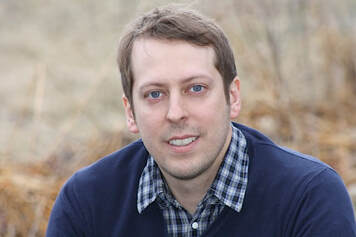
Gabriel Perron, Associate Professor of Biology Gabriel G. Perron is an evolutionary biologist who studies the emergence of medically important traits in a broad range of microorganisms. His research uses a combination of real-time evolution experiments, genomic and metagenomic approaches, and field studies to understand how bacteria evolve antimicrobial resistance. Using different microbial systems, including bacteria such as Salmonella, Dr. Perron work seeks to understand the impact of human activity on the presence of antibiotic-resistant bacteria in natural environments and its possible impact on public health issues. More recently, Dr. Perron has been also studying the impact of human activity on microbial communities found in Polar Regions.
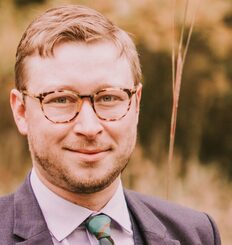
Rob Todd, Visiting Assistant Professor of Biology. Dr. Robert (Rob) Todd is a microbiologist, educator, and enthusiast of science outreach. His research focuses on genome instability and adaptation in the human fungal pathogen Candida albicans. Beyond typical laboratory research, Dr. Todd is interested in developing curricula and outreach opportunities that increase (and support) diversity and representation in science. Dr. Todd has worked as a Citizen Science faculty member at Bard since 2020, and is now happy to join Bard Biology as a Visiting Assistant Professor.
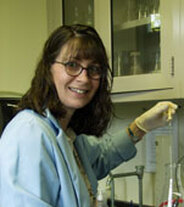
Maureen O’Callaghan-Scholl, Laboratory Manager Maureen O’Callaghan-Scholl is involved with the day-to-day happenings in the biology and chemistry laboratories. Her work includes preparing and setting up solutions, media, and equipment for the intro laboratory courses, maintaining equipment, scheduling outside services, ordering supplies, managing budgets and helping faculty and students with research project needs in addition to managing laboratory safety issues.
|

